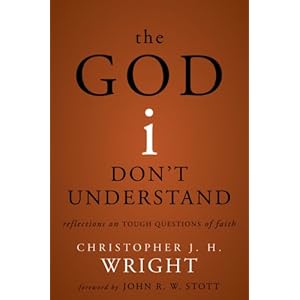No one wants to be deceived. Whether it’s a David Blane street ‘magician’ doing tricks with coins and watches, or Derren Brown with his weird deceptions. Just think of the uproar recently when it appeared that Tony Blair and the government had deceived the nation about the weapons of mass destruction in Iraq, and the necessity to invade. The truth is covered or masked, the eyes are averted, but everything seems to be fine.
It’s possible that we could be deceived by politicians or entertainers. But it’s also possible that we could also be deceived about our Christian life. Scripture tells us to watch out for false teachers, and reminds us about how Satan, the devil, is the grand deceiver. Yet the remarkable thing that James is teaching us tonight is that, yes, we may be deceived - but that it could be us deceiving ourselves!
Last month Johnny helped us to think about rejoicing in trials, because of the positive effects they bring - steadfastness, and eventually the crown of life (12). We can rejoice because God gives us wisdom to see things as they really are, living for Christ in this fallen world. Tonight James is going on to think about what the Christian life looks like, introducing the themes that he will later pick up on. For tonight, though, we’ll focus on the three ways that we can deceive ourselves: we can be deceived about anger; deceived about the word; and deceived about being religious.
So first of all, deceived about anger. Remember, these are Christians James is writing to (‘my beloved brothers‘), so this is about living as a Christian, not becoming a Christian. The warning comes from verse 16 right through to 21, but particularly in verse 19: ‘let every person be quick to hear, slow to speak, slow to anger.’ I don’t know about you, but these are the exact opposite to what I want to do. I want to be slow to hear, quick to speak, to jump in with my opinions and views, and quick to be angry. Particularly when I’m driving.
Isn’t that common? We’re quick to be angry, to be annoyed and upset because things aren’t done our way, concerned about our rights, standing up for ourselves. But James tells us to reverse those things - because ‘the anger of man does not produce the righteousness of God’ (20). We can’t live in a way to please the Lord if we’re so concerned with ourselves. It’s like the production line in a factory - if they put anger in, then they can’t produce the life of righteousness. Instead we need to stop deceiving ourselves about our anger and do something about it.
Look at how James puts it: ‘Therefore put away all filthiness and rampant wickedness and receive with meekness the implanted word, which is able to save your souls.’ Instead of deceiving ourselves about our anger (and the other evil that remains in our lives), we need to receive something - the implanted word. This is the word that brought us into being as Christians according to verse 18, and which, as the image suggests - the seed planted in us - bears fruit in us and is able to save us.
Notice also that we have to receive it with meekness. Anger is the expression of our rights, opinion, agenda. We turn that on its head, to meekly submit and receive God’s word.
Deception number one - that our anger and filthiness and wickedness is fine in Christian living. The solution is to receive the implanted word.
Yet our flesh isn’t going to give up that easily. Even as we receive the word, there’s a danger that we can deceive ourselves. James is very blunt about the danger, so let’s look at verse 22: ‘But be doers of the word, and not hearers only, deceiving yourselves.’
May I suggest that this is the particular danger for evangelical churches and Christians? We know that the Bible is God’s word, we honour it, we make much of it, we may read it morning and evening, or have it on our mp3 players, and know what it says, we could rhyme off memory verses or even whole chapters - but it could all be us deceiving ourselves.
James is saying that it is not enough to just hear God’s word - we also have to do it, to put it into practice. Otherwise, we’re deceiving ourselves and it’s just a show. To illustrate, James shows us the image of a man and a mirror. (You’re probably already thinking of that Michael Jackson song!). For us, mirrors are very common, I was looking round our house earlier, and we have at least four. But for James and his contemporaries, they were rare.
I don’t know how long you spend in front of a mirror in the morning, but the man here is looking intently at his face in the mirror. Maybe he sees he needs to wash his face or comb his hair. But his looking into the mirror was, in the end, pointless: ‘For he looks at himself and goes away and at once forgets what he was like.’ He might as well not have bothered, as he forgets what he needed to change.
In contrast (there’s the but again - 25), those who put into practice what they read in God’s word are pictured in verse 25: ‘But the one who looks into the perfect law, the law of liberty, and perseveres, being no hearer who forgets but a doer who acts, he will be blessed in his doing,’
God’s word, the Bible, is described as the perfect law, the law of liberty - the teaching of true freedom, the instruction for the path. But just like a mirror, it also shows us what we’re really like, and what we need to change. The straight contrast is there: the man in the mirror looks, goes away and forgets; whereas the doer looks, perseveres and acts.
Is our Bible reading just a bookmark moving exercise? Do we speed through the reading to get it done and then forget about it? Or do we take time to hear, and put it into practice? The blessing is there for the one who hears and acts.
Deception number two - that hearing the word is enough. The solution is to put it into practice.
In the final two verses of chapter one, we come to our final deception. But as we come to it, you might wonder what James is talking about when we says about being religious and about religion. After all, when we think of religion these days we want nothing to do with it. Just yesterday I was doing a funeral visit and the wee man said that there’s too much religion and not enough Christianity in our society. So why does James go on about religion? Surely we want relationship, not religion, we want Jesus, not outward conformity to rules?
All that is spot on, but the religious thing that James is talking about here isn’t the outward rules, but rather is more like spirituality - a relationship to God rooted in the heart and shaping the life. It’s not the way to be saved (by following the rules) but about living because you are saved. So here, when James says about someone thinking they are religious, it’s that they think they have a relationship with God, but their life doesn’t match their profession.
The deception for the supposedly religious person is that their life doesn’t fit - they don’t bridle their tongue (which reminds us of the anger we encountered at the start). They think they’re religious, but actually, they’re deceiving themselves and their religion, their witness, their Christian walk is worthless.
How is our witness? Are we walking what we’re talking? Or are we deceiving ourselves in this regard? We might deceive ourselves, but the watching world can easily spot an inconsistent walk - maybe we know this from work - how can he shout at his employees like that and him a Christian?! She’s meant to be a Christian but she gossips like anyone else...
As in the previous warnings about deceiving ourselves, James gives us the solution, the antidote, the way to change. Verse 27: ‘Religion that is pure and undefiled before God, the Father, is this: to visit orphans and widows in their affliction, and to keep oneself unstained from the world.’
Now I don’t know about you, but that is perhaps a surprising list. Put it together with bridling your tongue (26), and you have a list of acceptable religion of watching your tongue, visiting orphans and widows, and keeping unstained, or to put them another way, your words, the needy, and holiness. James isn’t saying that this is all there is to being a Christian (nor is he saying that you don’t need to pray/repent/read Bible/meet together in church etc). But why has he picked these three things as the marks of pure religion, of living out the relationship with God in our heart?
If you’re observant, or have read James before, you might notice that these are the topics that are addressed through the rest of the letter. So if you flick forward, you’ll notice that caring for the needy is addressed in chapter 2, particularly 2:5 - our faith in action; then in 3:1-12, the focus is on our tongues, for good or ill; and 3:13 introduces the theme of holiness - ‘good conduct’ which runs through to the end of chapter 5. Verses 26 and 27 are therefore the ‘launchpad’ into the rest of the letter, calling us to live out our relationship to God in these areas.
But there’s more. Do you notice how God is described in verse 27? God, the Father. James is urging us to live out our relationship, because these things are modelled on what God our Father has done - we’re called to demonstrate the family likeness. Look back to verse 18: ‘Of his own will he brought us forth by the word of truth, that we should be a kind of firstfruits of his creatures.’
Can you see these three same things in this verse? ‘Of his own will be brought us’ - guilty, helpless lost were we - God’s concern is for the poor and needy, an accurate description of us before Christ died for us, before we were saved. God’s concern for the needy should therefore be seen in our lives too, as we help the widows and orphans (those without support / provision if the father and husband has died).
‘he brought us forth by the word of truth’ - God’s word gave birth to us, if I can put it like that, and therefore we need to watch how we use our tongues.
‘he brought us forth... that we should be a kind of firstfruits of his creatures’ - God who is holy wants us to be holy as he is holy, to share the family likeness, in contrast to the world (anti-God, opposed to God and fallen, steeped in sin).
James has been warning us about the dangers of being deceived - about anger, about the word, and about being religious. It’s a serious challenge to how we live the Christian life. Yet we are graciously given every good gift, and exactly what we need to live for God, to live truly and purely religiously (in the right sense): the seed of God’s word which is able to save us, which we need to obey (and be changed by), to live it out in the family likeness.
In a sense, tonight’s passage is an excellent illustration of what James is saying. If we’re in danger, someone will shout a warning - if we’re about to be run over, or fall off a cliff. The warning is only useful for us if we take heed and change in response to it. It’s the same with God’s word. Will we merely agree and say yes to it, or will we change?
‘Be doers of the word, and not hearers only, deceiving yourselves.’
This Bible Talk was given at Mindset, the Youth Leader support and training network in Dundonald on Tuesday 9th March 2010.





